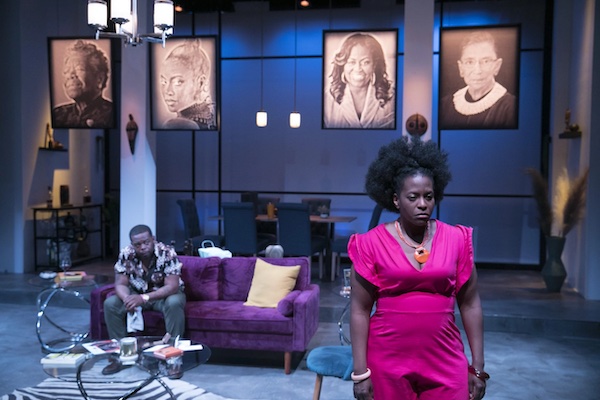Theater Review: “The Light” — Squeeze Play
By Bill Marx
This is a quicksilver drama about how a loving couple reacts as devastating bolts of lightning strike.
The Light by Loy A. Webb. Directed by Jacqui Parker. Staged by the Lyric Stage Company of Boston at 140 Clarendon Street, Boston, through June 26.

Dominic Carter and Yewande Odetoyinbo in the Lyric Stage Company production of The Light. Photo: Mark S. Howard
In “Burnt Norton,” T.S. Eliot wrote that “human kind cannot bear very much reality.” Of course, playwrights from the Greeks on already knew that. They focused on the dramatic possibilities generated by the emotional and psychological fault lines: How much reality could be borne? And who decided what was reality and what was illusion? Loy A.Webb’s two-hander script, The Light, deals with a Black couple in Chicago whose loving relationship is rocked (in one evening) by a series of shocking revelations, including truths that they had kept well hidden from each other. The showdown lasts about 65 minutes — the length of a one-act. That means the script, if it is to succeed, has to make a virtue of compression, each line of dialogue and bit of business building to a confrontation with painful reality. But Webb’s script isn’t compact but lumpy: it squeezes its various layers together — sit-com, soap opera, social debate — into a press sandwich of a drama.
This laxity is unfortunate because the Lyric Stage Company of Boston has fielded an impressive cast, Dominic Carter and Yewande Odetoyinbo. Jacqui Parker has formidable chops as a playwright, and as a director she is sensitive to the emotional fallout of each disclosure, though for my taste there is one too many of them. It takes a while for the show’s conflict to take off, but Carter, as firefighter Rashad, and Odetoyinbo, as Genesis, the principal of a charter school, do a fine job of making us care about this couple. These are intelligent, caring, humorous, flawed, and resourceful people approaching middle age who are thankful to have found each other. Their banter contains some amusing give-and-take, the teasing accented by evidence of their mutual need for each other. There are touches of underlying tension, such as a tiff inspired by Brett Kavanaugh’s nomination to the Supreme Court, but this two-year relationship appears to be strong. There is nothing to foreshadow what is to come, and that is problematic.
After Rashad proposes marriage and Genesis accepts, he follows that up with tickets to go to a concert that includes a musician the pair have strong opposing feelings about. A stalemate about attending the show turns into a furious and then pitiless face-off. No spoilers here, though amid the chunks of backstory and confessions there is also a discussion about who is less privileged in American society, Black men or Black women. That, and some other lobbing back and forth, smacks of what’s become a bad playwriting habit: the need to check off political boxes. The best two-handers (August Strindberg, Edward Albee, and Suzan-Lori Parks, among others) probe the see-saw of domination and submission. The combatants do not always play fair; they often fake each other out for the sake of advantage. Who knows how much one partner really knows about the other? The drama is not about its protagonists scoring rhetorical points. (Are Rashad and Genesis arguing with each other? Or hashing out issues for the sake of the audience?) There is little gamesmanship or ambiguity in The Light, and that flattens out the psychological conflict. This is a rather straightforward drama about how a loving couple reacts as devastating bolts of lightning strike.
Each of the performers is given a segment in the script that highlights their strengths. Carter makes the most of his comic flair in the prolonged opening sequence, amusingly playing to and away from macho stereotypes. Odetoyinbo rises to the occasion via her forceful delivery of the passionate outbursts that arrive at the climax, a powerful assertion of the resilience of Black women. Parker transitions smoothly through the script’s stacked layers, only floundering during the middle section, when it is hard to escape just how mechanically the charges and counter charges ping-pong back and forth. Baron E. Pugh’s scenic design for the Hyde Park condo is spot-on, though the quartet of photos of inspiring women arranged above the performers’ heads is a tip-off regarding from where The Light shines.
Bill Marx is the editor-in-chief of The Arts Fuse. For four decades, he has written about arts and culture for print, broadcast, and online. He has regularly reviewed theater for National Public Radio Station WBUR and the Boston Globe. He created and edited WBUR Online Arts, a cultural webzine that in 2004 won an Online Journalism Award for Specialty Journalism. In 2007 he created The Arts Fuse, an online magazine dedicated to covering arts and culture in Boston and throughout New England.
Tagged: Dominic Carter, Jacqui Parker, Loy A. Webb, Lyric Stage Company, The Light
